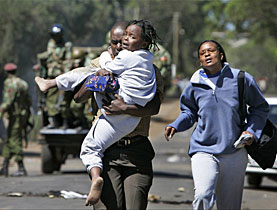Aid agencies struggle to bring relief in Kenya

The escalating violence in Kenya is complicating the work of humanitarian agencies operating in the East African country.
The Swiss-run International Committee of the Red Cross has expressed deep concern. The ICRC and other Swiss humanitarian agencies are continuing their work or offering emergency aid in worsening circumstances.
The ICRC statement came as African leaders gathered in neighbouring Ethiopia for an African summit meeting that started on Thursday. Kenya is set to dominate the agenda.
Geneva-based former United Nations head Kofi Annan has been in Kenya to help draw the government and opposition into talks to try to end the crisis resulting from last month’s disputed presidential election.
At least 800 people have died in uprisings, mostly in the Rift Valley region. Ahead of the talks, the top US envoy to Africa, Jendayi Frazer, described the recent violence in that area as “ethnic cleansing”.
In its statement on Wednesday, the ICRC raised its concerns about Kenya and warned that people had been killed in “horrible circumstances” or left with scars for life. Hundreds of thousands of people have been displaced, it added.
“New phase”
“The violence has entered a new phase,” said the ICRC’s head of the regional delegation in Nairobi, Pascal Cuttat.
“It broke out in the wake of elections but is now being driven by ethnic divisions and there is great risk of further deterioration.”
The organisation urged leaders in Kenya to uphold respect for life and dignity and to ensure that humanitarian agencies had access to those in need.
The ICRC has been doing relief work with the Kenya Red Cross Society and helping to restore contact for people separated from their families.
“The longer [the violence] is allowed to continue, the more difficult it will be to return to stability and bring about some form of reconciliation,” said Cuttat.
The effects of the violence are being felt by some Swiss organisations still active in the country.
Effects on projects
Zurich-based BioVision funds sustainable development projects in Kenya. It said there were no reported casualties among its Kenyan partners in projects along the coast or other areas, which are mostly away from the hub of the violence. But there are other effects.
“Everything’s slowed down, the whole economy is going down and logistics [are going down], like having gasoline or simple things like a prepaid card for a mobile phone,” BioVision CEO Andreas Schriber told swissinfo.
“And security, for many people who have to travel the situation is at the moment very unstable and dangerous at times, so lots of people may take more time to do the same job than before… these are the side effects which slow our project work down at the moment.”
For the time being the projects – such as organic farming advice and biological control of mosquitoes – will continue, and no major changes are planned, said Schriber, adding that the situation would be kept under review.
Emergency programme
The charity Caritas is also continuing its work.
“All our projects are going as usual and also our office in Nairobi is still open,” Caritas spokesman Stefan Gribi told swissinfo.
“What has changed is that we’ve started an emergency programme together with Caritas Kenya which helps 25,000 internally displaced people in Kenya. This is food support, water supply and also housing,” he said.
For its part the Swiss Agency for Development and Cooperation (SDC), which provided SFr200,000 ($183,000) in emergency aid for the ICRC appeal for Kenya at the beginning of January, said that it was continuing to observe the situation.
swissinfo, Isobel Leybold-Johnson
President Mwai Kibaki was declared the winner of December’s elections but supporters of his main challenger, Raila Odinga, have disputed the results. Since then violence has erupted, centred on the Rift Valley.
Ethnic tension is widely believed to be an underlying reason for much of the violence. There is resentment over the economic power some Kikuyus hold.
Kibaki says Odinga should fight his case in the courts and has offered to form a government of national unity. Odinga has called for an election re-run.
For United Nations Secretary-General Kofi Annan, who is leading negotiations on resolving the crisis, says it will take a year just to resolve the deep-rooted problems.

In compliance with the JTI standards
More: SWI swissinfo.ch certified by the Journalism Trust Initiative











You can find an overview of ongoing debates with our journalists here . Please join us!
If you want to start a conversation about a topic raised in this article or want to report factual errors, email us at english@swissinfo.ch.